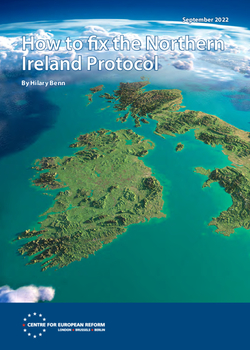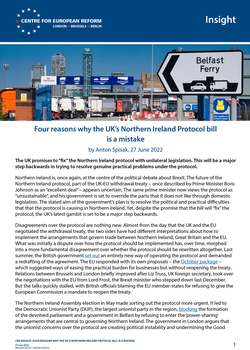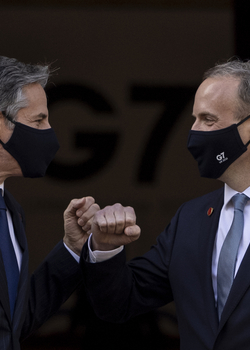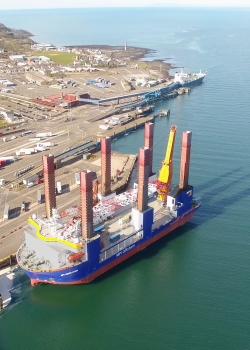
How to fix the Northern Ireland Protocol
Summary
- Brexit has meant leaving the EU’s single market and customs union, and everyone agreed there would be no border infrastructure on the island of Ireland. That required appropriate checks between Great Britain and Northern Ireland, in order to ensure that goods entering Northern Ireland destined for the Republic conformed to the rules of the EU’s single market.
- The UK government’s current approach to resolving the problems with the Northern Ireland Protocol has been counterproductive and has further undermined trust. But there are problems with the Protocol: some businesses in Britain and Northern Ireland are losing out, and the refusal of the Democratic Unionist Party to join the Northern Ireland Executive or allow the Assembly to meet means that the political institutions of Northern Ireland are not functioning and other pressing issues are not being addressed.
- Compromises are achievable.
- The EU should:
- Accept that just ending the ‘grace periods’ – which mean that some checks on goods are not being carried out – and implementing Commissioner Šefčovič’s proposals would make the situation worse, because these proposals would mean more checks than there are now. Further movement from the EU is needed.
- Accept that most supermarket supply chains pose no risk to the integrity of the EU internal market and should allow for few-to-no checks.
- Accept that limited divergence by the UK from EU standards and rules for products sold in Northern Ireland should not in practice create risks for EU consumers, and that a veterinary agreement – possibly based on equivalence - would help considerably.
- The UK should:
- Drop the Northern Ireland Protocol Bill, which is currently making negotiations with the EU impossible, including its confusing proposal that businesses in Northern Ireland should be able to choose between making things according to EU regulations and standards, or to UK ones.
- Acknowledge that many Northern Ireland businesses welcome the access to the EU single market that the Protocol gives them and that they will want to stay in step with new EU rules and standards, so they can buy and sell in a market of 450 million people.
- Propose a more far-reaching consultation mechanism for new EU laws applying to Northern Ireland.
- Both sides should be willing to compromise on issues like how the green/express lanes would work, the sharing of information, VAT, state aid and governance.
- The arguments over the Protocol must not be allowed to drag on. The longer they persist, the more likely they are to cause political instability and economic disruption on the island of Ireland. But if the arguments can be resolved, the UK and the EU can start to build a more constructive relationship.
One of the most striking features of Brexit is that those who argued most strongly for it appear unwilling to take any responsibility for its consequences. Nowhere has this been demonstrated more clearly than in the case of the Northern Ireland Protocol, which is part of the Withdrawal Agreement, an international treaty between the EU and the UK.
The Protocol was negotiated and agreed by the EU and the UK because both sides acknowledged that there was a problem with having Northern Ireland outside of the EU single market and customs union, and the Republic of Ireland inside them, while leaving the border open. And since the one thing that everybody agreed on was that there could not be any checks, infrastructure or customs officials on the border, some other way would have to be found to ensure that goods moving from Northern Ireland to the Republic conformed to the rules of the EU’s market.
This problem, of course, stems from Brexit itself. In 2018, the then Prime Minister Theresa May tried to negotiate an agreement in which the whole of the UK would effectively remain aligned to the relevant parts of the single market and the customs union, if no other solution could be found during negotiations over the long-term relationship, but that plan failed. And that left, as the only alternative, keeping Northern Ireland in the same parts of the single market and doing checks in the Irish Sea between Great Britain (GB) and Northern Ireland (NI). Thus, the Northern Ireland Protocol was born.
How the Protocol became contested
Once the Protocol was signed, however, the problems began as the then Prime Minister Boris Johnson declared that:
“There will be no checks on goods going from GB to NI, or NI to GB”.
He also called the Protocol “a good arrangement ... with the minimum possible bureaucratic consequences”, which was “fully compatible with the Good Friday Agreement”.
It is understandable why the Protocol was created, but it has led to economic and political problems.
The government’s own impact assessment, however, said something very different. “Goods arriving in Northern Ireland, including from Great Britain would undergo regulatory checks in accordance with EU rules” and an internal Treasury document was even more stark: “customs declarations and documentary and physical checks … will be highly disruptive to the NI economy”.
It is understandable why the Protocol was created, given the dilemma it was trying to solve, but it has led to economic and political problems. The Protocol has created challenges for businesses trying to send goods to Northern Ireland from Great Britain. And politically, the Protocol has resulted in the collapse of power-sharing in Northern Ireland, with the Democratic Unionist Party (DUP) refusing to enter the executive or even allow the Northern Ireland Assembly to meet, on the grounds that they object to Northern Ireland being treated differently to the rest of the United Kingdom in ways that undermine unionist identity.
The current war of words between the EU and the UK over the Protocol is deeply unhelpful; it’s like an acrimonious divorce. There is a complete lack of trust – the very thing that is needed to solve the problem – and until trust is restored, it is hard to see anything changing.
The EU argues it reached an agreement with the UK less than three years ago and now British ministers are trying to get out of it by unilaterally taking powers to over-ride the Protocol, while the UK argues that the EU wants to apply the Protocol’s rules in a wholly disproportionate way. The UK’s argument does not, however, square with what happened when the Protocol was originally negotiated and the UK suggested checks in the Irish Sea. And at the end of 2020, Michael Gove, who then led on negotiations over the Protocol, said he had reached an agreement with Maroš Šefčovič (the European Commissioner in charge of negotiations) “which now means that the Protocol can be implemented in a pragmatic and proportionate way.” It is no wonder that the EU distrusts the UK and has no idea what it will do next.
And yet the fact that the Northern Ireland institutions are not functioning is a real political problem for power-sharing and for stability in Northern Ireland, which the EU needs to recognise.
How to fix the Protocol
Although relations between the UK and the EU are now in a pretty bad place, it is possible to find a way forward, provided both sides are prepared to move and then engage in hard, detailed negotiation. The issues are indeed complex, but if politicians were capable of negotiating the historic Belfast Good Friday Agreement – an extremely finely balanced exercise in political courage, ingenuity and leadership – then surely they can craft a solution here.
So, what needs to happen?
The Northern Ireland Protocol Bill
The first thing the UK should recognise is that the Northern Ireland Protocol Bill is the wrong way to go about fixing the problem; indeed it is the biggest obstacle to reaching a deal with the EU. The Bill, currently going through Parliament, would allow the British government to disapply key parts of the Northern Ireland Protocol.
The Bill is clearly inconsistent with the Withdrawal Agreement that the UK negotiated and signed with the EU and it should be withdrawn.
If Article 16 is used at the same time as the Protocol Bill then the UK-EU relationship is likely to worsen.
Negotiations between the EU and the UK have stopped. And there have already been consequences which are symptoms of the stalemate. The EU has refused to implement the agreement to enable the UK to join the Horizon research programme – the UK Government is now in a formal dispute with the EU over this. And the EU has not only restarted its legal action against the UK for failing to implement the Protocol properly, but has extended it, including the complaint that the UK is not providing the EU with export declarations that Northern Ireland businesses are supposed to fill in when sending goods to Great Britain. There is a range of retaliatory measures open to the EU to take, which could include imposing fines on the UK – although the EU knows full well that these would not be paid – or imposing tariffs on sensitive and valuable UK exports to the EU, like cars. And at the very moment when the global economy is facing really difficult circumstances, are we seriously contemplating a trade war between the UK and its largest trading partner?
However, the new Prime Minister, Liz Truss, has promised to push ahead with the Northern Ireland Protocol Bill. In addition, she is reported to be planning to trigger Article 16 of the Protocol. This allows either party to undertake unilateral safeguarding measures if the Protocol leads to “serious economic, societal or environmental difficulties that are liable to persist, or to diversion of trade”. If either party is “considering” unilateral action, it must notify the other party as soon as possible through the UK–EU Joint Committee. At this point, both parties should enter negotiations to find a solution. If negotiations fail and either party adopts unilateral measures, the other may take “proportionate rebalancing measures”.
Invoking Article 16 could conceivably be a belated recognition that the right way to proceed is to use the Protocol’s proper dispute mechanism to try and reach a negotiated settlement with the EU. If, however, Article 16 is used while at the same time the new prime minister proceeds with the Northern Ireland Protocol Bill then the current crisis in the relationship is likely to worsen.
Grace periods
The reason there wasn’t a full-blown crisis from the start was because just before the new rules came in, both sides realised that there was very little time to prepare so it would be sensible to allow some grace periods. These have been a big help and have now been extended unilaterally by the UK, which led the EU to launch legal proceedings before putting them on hold while negotiations were held.
A year and a half has passed without the full application of the Protocol rules, and there has not been a single publicised example of the integrity of the EU single market being compromised. If, however, we start to see the UK diverging significantly from EU standards, this standstill will be much harder to maintain.
Checks between Northern Ireland and Great Britain
Maroš Šefčovič has acknowledged that there is a problem with checks and has made a number of proposals to reduce them. These are welcome, but although his plan would result in fewer checks than if the full EU rules relating to third countries were applied, traders say they would result in more checks on goods coming into Northern Ireland than we currently have (thanks to the grace periods). And because of the extra cost and bureaucracy these checks would impose, some GB businesses might simply stop supplying the Northern Ireland market. Therefore, what the EU is proposing at the moment is not a solution that would allow a new government to be formed at Stormont; the Commission needs to move further.
It is worth remembering that the Protocol recognises the unique status of Northern Ireland by talking about the concept of “goods at risk” – goods at risk of entering the Republic of Ireland from Northern Ireland. So, the central practical question is how do you differentiate between goods that will stay in Northern Ireland and those that will be travelling onwards across the border?
The EU’s starting position was that all goods were at risk unless the UK could prove that they were not, and the current position of the British side is that no goods are at risk unless the EU can prove that they are. The meeting place must, therefore, be somewhere in the middle.
Supermarket deliveries are a good place to start because most of the British supermarkets which supply Northern Ireland do not have stores in the Republic and their goods are not sold there. Therefore, it is perfectly reasonable to ask why there need be any checks at all on the large number of ASDA and Sainsbury’s lorries that come across every day, given that they are self-evidently only destined to supply shops in Northern Ireland. In my discussions with European colleagues, I have heard a variety of reasons as to why it’s not quite as straightforward as that, but in the end it comes down to a very small number of products where there might be a potential risk.
Take the example of oranges with black spot – a disease that harms orange plants but not human beings. The complication is that the UK is not currently inspecting oranges coming in from, say, Africa for black spot because we don’t have a domestic orange growing industry to protect from the fungus that causes it. The practical question is how would an orange with black spot sold in a supermarket in Armagh actually get to an orange grove in Spain, Italy or Greece? Could the supermarkets themselves undertake to check that the oranges they supply to Northern Ireland don’t have black spot?
Divergence may be the most difficult issue; for example, future UK food safety standards differing from the EU’s.
Then there is the problem of UK products that the EU doesn’t recognise. When the UK Trade and Business Commission1 visited Belfast recently, one supermarket told us that the full application of EU rules would not allow organic products into Northern Ireland, including organic baby foods which make up some 80 per cent of the baby food they stock. Why? Because apparently the EU doesn’t recognise the UK’s organic certification system. Surely this can be solved.
UK divergence
Perhaps the most difficult issue of all will be divergence; for example, where the UK decides to move to different food safety standards compared to those used by the EU. There is no ready answer to this, although at the moment, almost all food produced in the UK is made to exactly the same standards that applied when we were an EU member. An EU/UK veterinary or sanitary and phytosanitary agreement would help eliminate a lot of checks but the EU is reported to want dynamic alignment – that is where the UK would apply EU rules and every time they changed the UK would have to follow suit – rather than an equivalence agreement where we would recognise each other’s systems as being broadly the same in upholding high safety standards. The EU has an equivalence agreement with New Zealand for some food products which leads UK ministers, not unreasonably, to ask, “if you can do equivalence with New Zealand then why can’t you do it with us?”
Things, however, could get more difficult when standards diverge. Take the example of titanium dioxide which is used as a whitener in cakes and ice cream. The EU has now banned its use on the grounds that it may damage DNA while the UK has no plans to do the same. What should then happen to a cake containing titanium dioxide heading for Northern Ireland? Should it be banned from entering or should the EU not worry about it on the grounds that it is only going to be sold in a Northern Ireland supermarket? If the EU argues that consumers in the Republic of Ireland would potentially be at risk, then where should liability lie? In practice, shoppers from the Republic would have the option of choosing not to buy the product from a supermarket in Northern Ireland if they had any concerns. Limited divergence by the UK from EU standards and rules for products sold in Northern Ireland would not in practice create risks for EU consumers.
There’s also a broader question here about who gets to set product standards in an increasingly globalised trading system. With European, US and Chinese standards largely dominant, what exactly is the benefit to UK trade of wanting to diverge?
The UK’s provision of information to the EU
There has also been an argument about the provision of information by the UK about trade flows between Great Britain and Northern Ireland, including customs codes. The EU says that the UK has not been giving it access to the necessary databases. The UK says that it has. The EU says that the UK has not fulfilled a promise to put labels on goods saying ‘For sale in Northern Ireland only’, while British manufacturers argue that doing this would be disproportionate and costly. The EU says that it needs a customs code on goods moving from Great Britain to Northern Ireland to identify exactly what the product is so that they can feed this information into their risk assessment algorithm. The UK government doesn’t like this idea both for reasons of principle – why do you need a customs code for goods moving from one part of the UK to another? – and practicality. The supermarkets say it’s too much trouble, and for much smaller British firms which sell a small amount of goods into Northern Ireland, it is even more difficult to identify a code that they have never needed before.
Amid all this back and forth, there must be a compromise possible in which sufficient information is provided to the EU that enables it to run this through its risk assessment systems without imposing unreasonable burdens on smaller businesses.
Green channels and express lanes
For the movement of goods, the two sides say they are in favour of a ‘green channel’ (the UK) or an ‘express lane’ (the EU) for products coming into Northern Ireland from Great Britain. Those goods that are going to stay in Northern Ireland could come through this channel/lane while those that would be travelling on to the Republic would have to be fully checked. The UK view is that there would be no checks on green channel goods, whereas the EU sees an express lane as having reduced checks, so the two sides differ. It is worth noting that the Northern Ireland Protocol Bill talks about goods “destined” for Northern Ireland as if there was an easy way of ensuring that goods from Great Britain arriving in Northern Ireland will definitely stay in Northern Ireland.
It is not clear what the UK’s dual regulation proposal is for and it should be dropped.
To operate channels or lanes, a trusted trader/trusted product system will be needed, in which the trader declares that they only trade with people or businesses in Northern Ireland. The EU might accept that supermarket deliveries do not need checks, but they are much more worried about many small businesses in Great Britain sending goods to Northern Ireland, which may then travel onwards to the EU. This is particularly tricky for those goods which are imported into Northern Ireland, processed into another product, and then sent on to the Republic.
One approach would be to require firms to make a declaration, with very tough penalties for those who try and abuse the system, but the truth is that both sides will need to have a sensible discussion about the degree of actual risk and adjust any checks and paperwork accordingly. Will there still be the possibility of smuggling? Yes, but no system can eliminate that, and the best defence against it is intelligence-based checks.
There are also disputes about being able to sell Scottish seed potatoes in Northern Ireland, the need for customs declarations on parcels sent from Great Britain to Northern Ireland, and about how much it costs people to take their guide dogs to Northern Ireland because of new veterinary requirements.
Dual regulatory regimes
An added complication is that the Northern Ireland Protocol Bill, as well as giving the UK government the power to disapply the Protocol, is also proposing a dual regulatory regime in Northern Ireland, with companies being free to choose whether to make their goods in accordance with EU or UK standards. It is not yet evident how this could work in practice, and there is opposition to the idea from some businesses in Northern Ireland. Apart from being an example of the UK exercising its sovereignty, it is not clear what this proposal is for and it should be dropped. It is striking that the Bill also gives ministers the power to tell particular sectors which standards they must use, which is hardly a sign of confidence in the idea of a dual system.
If all this wasn’t complicated enough, there are three other problems: VAT rates; state aid and the role of the ECJ.
VAT
On VAT rates, Northern Ireland is currently required by the Protocol to abide by EU law relating to VAT, but this may become less of a problem as the EU is in the process of changing its own rules to allow for greater flexibility on VAT rates. The two sides differ on whether the UK would require the permission of the EU to use the same VAT rates in Northern Ireland that apply in the rest of the UK. UK ministers will not accept this breach of sovereignty. One way of solving this problem would be for the EU to agree that the UK is perfectly free to apply a common VAT rate across the whole of the UK, including in Northern Ireland, but if the EU has any concerns from a competitiveness point of view then it could refer the matter to the adjudication mechanism established as part of the Trade and Co-operation Agreement to ensure a level playing field.
State aid
On state aid, the same issues of sovereignty and competition apply. Some worry that the interpretation of the Protocol’s rules on state aid could mean that the EU regime applies not only to cases in Northern Ireland, but also to companies based mainly in the UK that do some business in Northern Ireland. This could potentially give the European Court of Justice (ECJ) a role in deciding UK state aid policy.
However, Michael Gove, giving evidence to the Commons Committee on the Future Relationship with the EU on 11th March 2020, said that he thought in practice businesses based in Great Britain were unlikely to be subject to EU state aid rules and that “the effective working of the Protocol is a matter for the Joint Committee”. Some Europeans express surprise that state aid should be a practical concern for the UK, given that EU member-states seem to be able to give state aid to their businesses without falling foul of the European Commission. Sometimes the best way to deal with a potential difficulty is not to make an issue of it!
Governing the Protocol
On the role of the ECJ, this was not a concern at the time the Protocol was signed, but subsequently the UK Government has chosen to make it one. Given that single market rules apply in Northern Ireland, it is logical that if there is a dispute about the interpretation of those rules then the only court you can go to in order to ask for an opinion is the ECJ. After all, it is the guardian of the Treaties and of the single market. A separate question, however, is how and when those rules should be applied to the special circumstances of Northern Ireland. And is the ECJ really the right body to settle any dispute?
Medicines proved that the EU can be flexible in the application of the rules when it wants to.
The issue of medicines is an interesting example. The EU recognised quite early on that if it had fully applied single market rules to medicines then there would have been a big problem about NHS patients in Northern Ireland getting access to NHS medicines. Because this issue also affected one or two other member-states, the EU decided to change its own law to permit these medicines to continue to flow across the Irish Sea, notwithstanding what the Protocol said.
This proved that the EU can be flexible in the application of the rules when it wants to, and so if they can do that for medicines for human consumption, then they could also do it for, say, veterinary medicines or other potential problems. This approach also offers a way through the conundrum that the UK side says that the Protocol must be changed while the EU says that it cannot be. If the EU changes its own laws to give effect to some of the demands of the UK, then honour might be satisfied on all sides.
The DUP argues that there is a democratic deficit in Northern Ireland because its elected representatives have no say over EU rules. It is true that Northern Ireland has to abide by a whole set of European laws that are listed in the Annex to the Protocol and by any subsequent changes affecting that single market legislation. However, this should be put in perspective.
Firstly, being in the single market gives Northern Ireland businesses an advantage because they are able to sell to the EU market of 450 million people as well as to the rest of the UK. That’s why polls in Northern Ireland consistently show that a majority of Northern Ireland businesses support the Protocol.
Secondly, the rest of the UK is also following almost all of these rules currently, because the government decided to transfer EU legislation across into UK law at the moment we left the EU. It is known as EU retained law. The government is now talking about going through all of this retained law to see how much of it they want to keep, but for British and Northern Ireland businesses exporting goods to the EU they are, of course, going to continue to make those goods to EU standards in order to be able to sell them into the EU market, whatever the government decides.
In the light of this, the democratic deficit in Northern Ireland will only apply to new EU laws that are introduced in future, some of which will no doubt be welcomed as being sensible. While recognising that single market rules are for the EU to decide, the UK should propose a formal process of consultation with Northern Ireland politicians and businesses about whether, and if so how, any new rules should apply in Northern Ireland.
Conclusion
The truth is that if Northern Ireland wants to have continuing access to the single market, it will have to follow single market rules. Some say that if controls across the Irish Sea were unilaterally removed by the UK then the EU would not impose controls on the border between Northern Ireland and the Republic. But in such circumstances the EU could simply declare Northern Ireland, like the rest of the UK, to be a third country. This would make life for Northern Ireland businesses much more difficult, because it could result in Northern Ireland in effect being removed from the single market. If that were to happen, the majority in Northern Ireland who support the Protocol would definitely have something to say about it, and what would the government do if other political parties then decided to follow the DUP’s example and seek to prevent the institutions from working because they objected to this loss of access to the single market? The point is that cross-community consent works both ways.
The Republic of Ireland’s biggest worry is that if goods start coming into the Republic which are not compliant with single market rules, then the EU might eventually tell Ireland to start checking those goods before they leave the country to travel on to France, Germany or Greece. This could, in practice, damage the Republic’s place in the single market.
Is all of this impossible to sort out? No, provided both sides get together and apply some effort and ingenuity. All that’s missing is trust and political will, and it’s in nobody’s interests to carry on like this. The UK and the EU are both going to have to compromise because neither the Northern Ireland Protocol Bill nor taking the UK to the ECJ are going to be the answer.
And the most important reason why a solution is required is that until one is found, there is very little chance that we can make progress on building the new, but different, economic and political relationship between the UK and the EU that is needed, if we are to start to mitigate the effects of Brexit.
Hilary Benn MP for Leeds Central and Co-Convener of the UK Trade and Business Commission
September 2022
View press release
Download full publication





